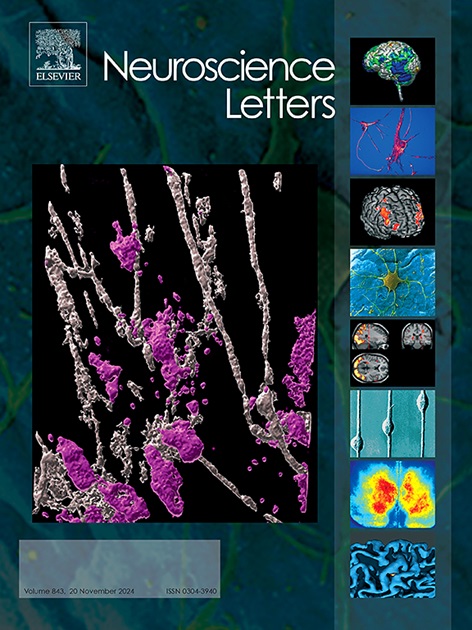C1ql3促进小鼠的认知灵活性行为。
IF 2.5
4区 医学
Q3 NEUROSCIENCES
引用次数: 0
摘要
认知灵活性,即根据变化的环境调整行为策略的能力,在某些神经精神疾病患者中是缺乏的,比如自闭症谱系障碍和精神分裂症。认知灵活性可以在人类和动物模型中使用注意力转移任务来测量,这需要前额叶皮层(PFC)和其他关键大脑区域的活动。我们利用C1QL3破坏的小鼠模型证明,C1QL3是一种参与调节PFC和其他脑回路中兴奋性突触密度的蛋白质,对注意力集中转移很重要。成年小鼠PFC神经元中C1ql3的条件性缺失并不足以损害注意力设置转移行为,这突出了C1ql3通过在其他关键脑回路和/或神经发育过程中的表达促进认知灵活性的潜在作用。本文章由计算机程序翻译,如有差异,请以英文原文为准。
C1ql3 promotes cognitive flexibility behavior in mice
Cognitive flexibility, the ability to adapt behavioral strategies based on changing circumstances, is deficient in patients with certain neuropsychiatric disorders, such as autism spectrum disorder and schizophrenia. Cognitive flexibility can be measured in humans and animal models using attentional set-shifting tasks, which require activity of the prefrontal cortex (PFC) and other key brain regions. We demonstrate that C1QL3, a protein involved in regulating excitatory synapse density in the PFC and other brain circuits, is important for attentional set-shifting, using a mouse model of C1ql3 disruption. Conditional deletion of C1ql3 from neurons specifically in the PFC of adult mice was not sufficient to impair attentional set-shifting behavior, highlighting the potential role of C1ql3 in promoting cognitive flexibility through expression in other key brain circuits and/or neurodevelopmental processes.
求助全文
通过发布文献求助,成功后即可免费获取论文全文。
去求助
来源期刊

Neuroscience Letters
医学-神经科学
CiteScore
5.20
自引率
0.00%
发文量
408
审稿时长
50 days
期刊介绍:
Neuroscience Letters is devoted to the rapid publication of short, high-quality papers of interest to the broad community of neuroscientists. Only papers which will make a significant addition to the literature in the field will be published. Papers in all areas of neuroscience - molecular, cellular, developmental, systems, behavioral and cognitive, as well as computational - will be considered for publication. Submission of laboratory investigations that shed light on disease mechanisms is encouraged. Special Issues, edited by Guest Editors to cover new and rapidly-moving areas, will include invited mini-reviews. Occasional mini-reviews in especially timely areas will be considered for publication, without invitation, outside of Special Issues; these un-solicited mini-reviews can be submitted without invitation but must be of very high quality. Clinical studies will also be published if they provide new information about organization or actions of the nervous system, or provide new insights into the neurobiology of disease. NSL does not publish case reports.
 求助内容:
求助内容: 应助结果提醒方式:
应助结果提醒方式:


